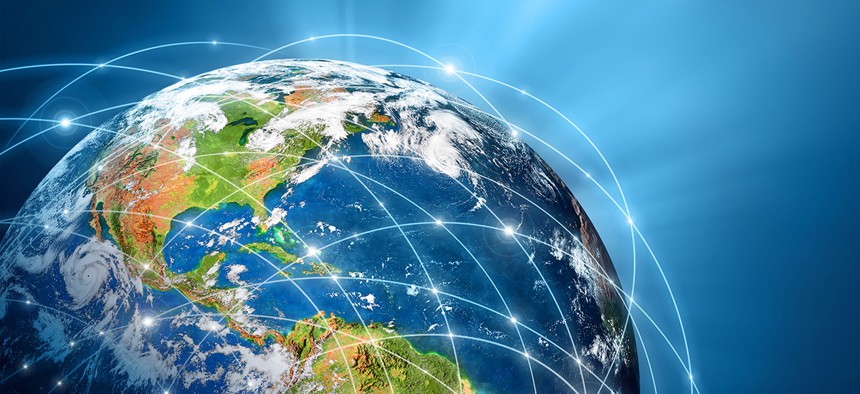The Global Economic Damage of Internet Blackouts

Toria/Shutterstock.com
Last year, the world economy lost at least $2.4 billion when governments intentionally shut down their countries’ networks.
Last weekend, cellphones across Iraq lit up with the same text message. “Dear subscriber,” the message read in Arabic. “On instructions from the Ministry of Communications, internet access will be cut off every day between October 1 and 8, from 6 to 9 a.m. These instructions were issued to every internet service provider.”
The scheduled blackouts coincided with the third round of national placement exams for sixth graders in Iraq; the blackouts are intended to keep students from cheating. The country has made a habit of interrupting internet access nationwide during the exams: I wrote about another episode in detail earlier this year.
Intentional, government-instigated internet blackouts are becoming more and more common. And when governments choose to shut off the internet—if not to prevent cheating, then to stifle political protests, as in Egypt in 2011 or in Gabon just this month, or ostensibly to fight terrorism, as in Iraq in 2014—the downtime can have far-ranging consequences. It prevents citizens connecting with the rest of the world. It can make it difficult to request emergency services. If a country’s already experiencing unrest, it can give cover to serious human-rights abuses.
The type of government that’s willing to darken the internet for hours or even days on end may not be particularly moved by the free-speech or human-rights implications of a blackout. But it’s difficult to ignore the side effects detailed in a new report from Brookings, which studies the widespread damage even a short hiccup in connectivity can deal to a country’s economy.
In the report, Darrell West, the director of the think tank’s Center for Technology Innovation, examines the economic effects of 81 internet shutdowns that took place in the span of a year, between summer 2015 and 2016. Based on the reduction in economic activity during the shutdowns, he estimated that they cost a minimum of $2.4 billion in GDP, globally.
The country most economically harmed by its own internet shutdowns was India—by a long shot—which lost out on nearly $1 billion in GDP, according to West’s calculations. The bill for Saudi Arabia’s blackouts came to $465 million, Morocco’s was $320 million, and Iraq’s amounted to $209 million.
To show the increasing frequency of blackouts, West cites a 2011 study from a trio of researchers at the University of Washington that tracked the number of times a government “interfered” with the internet in its country. The study found that the number of interferences began climbing rapidly in the mid-2000s, peaking at 111 in 2010, the last year the researchers examined. Since then, the problem has only gotten worse.
“National blackouts these days seem fairly unremarkable due to the prevalence as of late,” says Doug Madory, the director of internet analysis at Dyn, a company that monitors and reports on problems with the global internet. He cited scheduled interruptions during exams in Iraq and Syria; partial blackouts in politically unstable parts of Venezuela, Ethiopia, and Kashmir; and occasional targeted bans on social media platforms in countries like Pakistan, Turkey, and Brazil.
4 blackouts in Iraq in past 5 days for 6th grade exams on Islam, Arabic, English & Math. Daily outages to continue thru 9-Oct. pic.twitter.com/9VBhrHa426
— Dyn Research (@DynResearch) October 3, 2016
I asked West why he focused on the economic harm of internet blackouts, when they bring also about so many other ill effects. He said he was drawn to the question because no one had attempted to calculate the damage in monetary terms before—and because it might attract renewed attention to the issue.
“I thought this would be a substantial contribution to people’s understanding because it shows how countries are shooting their economies in the foot through shutdowns,” he said.
Madory said the approach is a valuable one.
“The hope is that a government would be less likely to order an internet blackout if it knew the negative impacts of such a decision in terms of hard dollar figures,” he said.
But developing those estimates is an inexact science. Most of the time, when a government interferes with internet services, it simply shuts down access in the entire country—but sometimes, governments take a more surgical approach. In 22 of the 81 cases West studied, only a subset of mobile networks were taken offline; in 14 cases, governments only banned one or more apps or services (think WhatsApp, YouTube, or Facebook). West tailored his math to take into account the differing extents of government intrusion.
There are still a lot of factors missing from the analysis, West concedes, which likely means the $2.4 billion price tag for one year of shutdowns around the world is an underestimate. It doesn’t take into account the effects periodic shutdowns might have on investors’ confidence in an economy, for example, or the pressure of lost tax revenue that would accompany any economic slowdown.
“Shutdowns directly harm the biggest multi-nationals and the smallest start-ups by preventing mobile transactions and blocking access to markets,” said Peter Micek, global policy and legal counsel at Access Now, a digital-rights advocacy organization.
“More broadly, this dangerous practice defeats trust in the internet economy, and tells the world your country is closed to business,” he continued. “We expect more investors, development banks, and lending agencies to take a hard look at governments who order shutdowns—and the companies that execute the orders.”
When it’s time for the next round of national exams in Iraq, the reasoning goes, perhaps the government will think twice about scheduling daily internet outages, if it’s burdened with the knowledge that each hour that networks remain down costs the country dearly.
NEXT STORY: Shooting for Space, to Make Life Better on Earth






